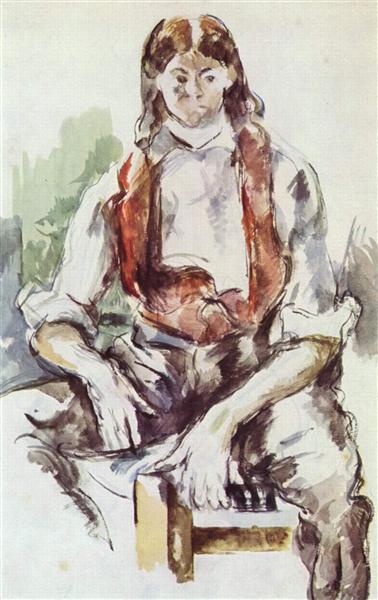Description
In Boy in a Red Waistcoat (1890), Paul Cézanne achieves one of his most captivating depictions of childhood, conjuring not just the figure of a child but a meticulous exploration of form, color, and light. Dating from late in the artist’s career, this painting illustrates his evolution toward an approach that breaks down reality into its most essential elements, characteristics that position him as a precursor to modernism.
The central figure of the child, notable for his vibrant red waistcoat, is presented with an air of naturalness and simplicity that is itself the product of complex artistic construction. The infant's face, with a serene and contemplative expression, is delicately balanced between detail and simplification, a hallmark of Cézanne's style. The use of short, loose brushstrokes, which form a rich and palpable texture, allows the viewer to connect with the three-dimensionality of the character, although the depiction of the figure is curiously flat compared to the detailed background.
The composition of the work follows an almost geometric approach, where the shapes of the child's body and head are sketched with care in mind, evoking both individuality and a connection with the nature around him. Cézanne, known for his interest in underlying structures, employs dark tones in the background that contrast with the red waistcoat, enhancing the luminosity and energy of the figure with an almost painterly effect that evokes the play of light and shadow. This visual dynamism underlines the sense of life that Cézanne tries to capture in the work.
Chromatically, the palette is dominated by warm colours that evoke an intimate atmosphere, where the red of the waistcoat resonates with the tones of the boy’s skin, creating a visual and emotional bond. This focus on colouring highlights Cézanne’s mastery in using colour to express feelings beyond simple representation. The inclusion of the waistcoat, a distinctive and almost performative element in the boy’s clothing, can be interpreted as a tool to portray youth and cultural characterisation in a context that, although specific, transcends towards the universal.
Cézanne, who constantly sought harmony between the elements of the canvas, and his great technical mastery is evident in how he arranges each part of the picture, from the folds of the waistcoat to the way the shadows fall on the boy's spherical, gentle face. This interrelationship of elements resonates with the ethos of his work in general, where each visual component is essential to the whole, just as each note of a chord is vital to a musical composition.
The Boy in the Red Waistcoat is not only a portrait of childhood, but an exploration of perception and the construction of reality, fundamental elements in Cézanne's art. In this sense, it represents a synthesis of his aesthetic quest and a testament to his right to be considered an innovator in the history of art. The interactions of colour, form and structure in this painting not only reveal the artist's skill, but invite us to reflect on the meaning of images in our everyday perception of the world.
KUADROS ©, a famous painting on your wall.
Hand-made oil painting reproductions, with the quality of professional artists and the distinctive seal of KUADROS ©.
Painting reproduction service with satisfaction guarantee. If you are not completely satisfied with the replica of your painting, we will refund 100% of your money.

